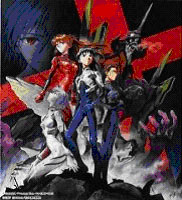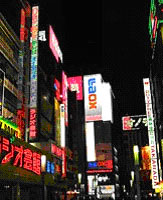Akihabara Dreams and the New Otaku by Brian Ruh 23 April 2003 I walk out of the Akihabara train station toward the exit labeled "Akihabara Electric Town". Before I reach the ticket gates, I am greeted by a large image on the floor advertising the re-release of the anime television show Neon Genesis Evangelion on DVD. I relax and smile, reassured about my cultural competence; even as an American in Japan, I think I must know the show better than half the people passing through the gates, tromping across the image of a teenage boy clutching an injured teen girl with blue hair. Before I even left the station, I knew I was in a place I would recognize. I was in the land of electronics stores and anime shops: Akihabara. The antipode of Shinjuku on Tokyo's circular Yamanote train line, Akihabara has become ground zero for the dissemination of consumer electronics and associated content such as DVDs and video games. Think of it as a Best Buy on speed that has spread to encompass many city blocks. One of my Tokyo guidebooks describes Akihabara as where Neuromancer author William Gibson would go to shop for groceries. This is where people from all over, including Japan, can go to literally buy into their dreams of Tokyo as a real-life version of Blade Runner. Akihabara provides a perfect vantage point for analyzing the cultural phenomenon known as otaku. In a previous column "Toward a New Type of Culture" (I>PopMatters 17 December 2002), I translated otaku as a "geek" — someone who is into Japanese animation, comics, and video games. While this translation is accurate in some respects, it glosses over some of the more subtle nuances of the term. While I won't go into the whole etymological back story of the word, it has come to mean a fanatic who is heavily invested in some aspect of culture and who rejoices in the knowledge of obscure minutiae. In recent years, the word "otaku" has been freed of its ties to Japanese culture due to its appropriation by American fans and associated media. In a "Modern Boys and mobile girls" (Guardian Unlimited, 1 April 2001), William Gibson talked about the otaku as being "the passionate obsessive, the information age's embodiment of the connoisseur, more concerned with the accumulation of data than of objects." I find the acceptance of the otaku, and its elevation as a paradigm for the way one should behave in a high-tech society somewhat troubling. As Gibson states, the otaku is, indeed, concerned with the accumulation of information. But in a modern capitalist society, this is necessarily intertwined with the acquisition of objects. I consider myself a scholar of Japanese popular culture, thus my purchases of graphic novels and DVDs can be considered research. I often feel that I should be buying less stuff, but I can justify such procurement because I can slip into the guise of academic objectivity as it suits my needs. Similarly, even if the purchase of such artifacts of popular culture is not the main goal of the otaku, the items are necessary to further the purported "accumulation of data". Akihabara is a perfect example of an otaku's playground. It is a place where a wide range of one's emotional needs can be handled through technology and media; little human interaction is necessary, other than with the cashier in order to complete one's purchase. One can experience vicarious adventure, love, and even sex through the technological machinations available in Akihabara. However, to single out such a small area as Akihabara for criticism would be unfair. Otaku are not endemic only to Japan. Recent coverage of the conflict in Iraq demonstrates the proliferation of the otaku mindset throughout mainstream America. The 24-hour cable news network format caters explicitly to news junkies, the people who stay on top of every latest development. The ready availability of news on the Internet has contributed to the otakuization of ordinary people. Stories have been told recently of people neglecting their jobs at work, bogging down their network servers as they stream the latest news onto their desktops. I have personally been shying away from much of the televised news coverage of Iraq, as it is too quickly ready to suck the viewer into a proverbial tornado. Perhaps I'm just not an Iraq conflict otaku, though. On the other hand, perhaps this is a mischaracterization of the otaku. In his essay "I Discovered the Word", anime scholar Carl Gustav Horn counters the abovementioned idea of the otaku, stating "I am dissatisfied with 'otaku' being a status one reaches upon owning a certain amount of JPGs and idol cards, dubious of the prospect of there being an achievement in achieving a sufficient physicality of fantasy, a real big pile of the unreal." Horn is opposed to the idea of the otaku as someone who uses his or her interests as an escape from everyday life. Much has been said about "liminality" in academic analyses of anime (especially in the work of Professor Susan Napier). While one view of the otaku may be the acquisitive, antisocial recluse, another, more positive view is the otaku as liminal traveler: one who departs into fantasy worlds in order to obtain knowledge and growth. However, some otaku seem to forget the latter part of this role, preferring to reside in their fantasy worlds rather than return to reality. The image from Neon Genesis Evangelion on the floor of the Akihabara station (which, given the rapid rate of change in Tokyo, may be gone by the time you read this) serves as both an invitation and a warning to the approaching visitor. At the end of the Evangelion series, protagonist Shinji discovered that it was essential for him to connect with other human beings. And yet this message is conveyed through an animated television program highlighting combat among giant robots, battling for the fate of the entire planet. The image at the floor of the station signifies that one is about to enter a world in which such fantastic occurrences are accepted and incorporated into people's lives, but it also warns that the visions are not necessarily to be accepted as truth or reality. The otaku may, indeed, serve as a signpost for the future as an intelligent way of comprehending the ever-increasing flow of information. With any luck, it will be a future of connection and growth, rather than one of solitary nodes, blinking in the darkness. |
 |
| Neon Genesis Evangelion | |
 |
|
| "Akihabara lights" by Sarah Ruh | |